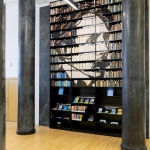

On 23 and 24 of March, Martynas Mažvydas National Library of Lithuania held a Francophone film festival which brought together dozens of people who love or are involved in the French language, French-speaking countries and their cultures. The festival saw the screening of as many as 9 films which represented different countries: Moldova, Belgium, France, Switzerland, Romania, and the Czech Republic. The representatives of the embassies of the francophone countries to Lithuania gave their welcome addresses and introduced the attendees to the films reflecting their countries. The Francophone Film Weekend is just one part of the broader National Library programme dedicated to celebrating International Francophonie Day. This day has been celebrated since 1990 and symbolises peace, unity and solidarity among the nations.
The Francophone Film Weekend is a joint project launched this year and made possible by joint efforts of the Ministry of Foreign Affairs of the Republic of Lithuania, Martynas Mažvydas National Library of Lithuania, French Institute in Lithuania and Embassy of France in Lithuania. The project aims at promoting and developing cultural diplomacy. In his welcome address to the attendees of the Francophone film festival, the National Library Director General Prof. Dr. Renaldas Gudauskas said that the National Library is an open place for cultural diplomacy projects.
“Traditionally, libraries are seen as peaceful retreats but our library is unique. Our library grounds offer a serene, quiet and nice place to create, study and work, but we are also happy to have an active and busy space hosting 1,500 events annually. Among the events that are very special to us are those held in partnership with the Ministry of Foreign Affairs of the Republic of Lithuania, and also in this case, with the French Institute in Lithuania and the embassies of the French-speaking countries. We call this a cultural diplomacy process. We got off to a good start, and it is my hope that with the help of everyone involved, we will go even stronger,” said Prof. Dr. Gudauskas.
Francophonie has often been exclusively associated with France and its culture but this stereotype is no longer valid, claims Snieguolė Kavoliūnienė, the Director of the Language and Education Programme at the French institute in Lithuania. The International Organisation of the Francophonie currently brings together 88 countries, and Lithuania is celebrating the 10th anniversary of being a member of this organisation. The main element that all member countries have in common is the French language and the opportunity to share their culture using this language. This promotes multilingualism and development of cultural diversity.
Sergei Mihov, Ambassador of the Republic of Moldova to Lithuania, sees the Francophone Film Weekend as a unique opportunity to foster one’s culture and to present one’s country and its culture to the world. “I am really happy to see us all joining these programmes and searching for common threads in terms of culture. I think this event is essential in that it shows young people that it is very important to learn multiple languages, to master them and to explore cultures through languages. Do not forget that the French language is the official language of the Olympic Movement and the lingua franca of diplomacy and of culture. It is a language that helps foster values promoted by the International Organisation of the Francophonie, namely, human rights and cultural diversity,” Moldovan Ambassador, Mr. Mihov, shared his insights.
His views were echoed by French Ambassador to Lithuania, Claire Lignières-Counathe. She thanked the organisers of the Francophone Film Weekend for their diverse and polyvalent approach. “Francophonie extends beyond France. As evidenced by the rich programme, it includes multiple countries. The main message of the Francophonie world is about cultural diversity. Thank you for your diverse and polyvalent approach,” added Ambassador C. Lignières-Counathe.
Film enthusiasts were not scared of the language barrier they encountered when watching Czech, Romanian, Belgian and Swiss films shown in their original language with French or English subtitles and were excited about the variety of film genres and styles. The festival saw the screening of the following short films: Spectrum, Salix Caprea, Paparuda (Moldova), and the following feature length films: Those Who Work (Switzerland), A Voix Haute – La Force de la Parole (France), Wedding (Belgium), Soul’s Redemption: A Pocket Guide, Short Circuit (Romania), and Clowns (Czech Republic). The Francophone Film Weekend programme ranged from fiction films to documentaries, from comedy-infused dramas to thrillers, and from art films or films based on true stories to motion pictures embedded with mystical elements. Based on individual selection criteria, the embassy of each country had chosen the films that they wanted to share with the viewers. While all motion pictures were unique in their own special way, the majority of them gave a glimpse into the culture and daily realities of each country. The common threads running through the plots of those films included a drama element, social problems and the attempt to show that each individual may act differently when faced with various, especially critical life situations.
Belgian Honorary Consul Jacques Barbier, when presenting the film Wedding, said: “Belgium is a diverse and multicultural country and with this film we want to draw your attention to the country’s cultural diversity, woman’s place in society, ways to resolve conflicts and the necessity to maintain a dialogue. Opinions may vary, confrontations may occur but we need to find solutions. This shocking film is based on a true story and shows us that people may face difficult situations and their attitudes toward them may be very different.”
The Francophone Film Weekend was a success this year and next year it is expected to bring us an even broader and more diverse repertoire. The growing number of countries who wish to showcase their culture, art and everyday realities will further accelerate the development of cultural diplomacy.



